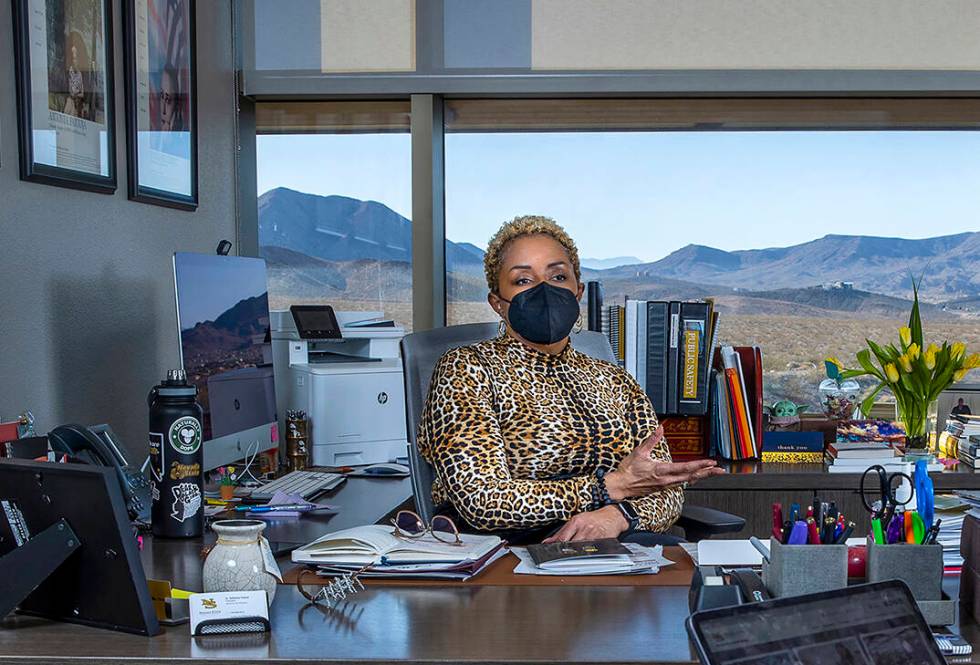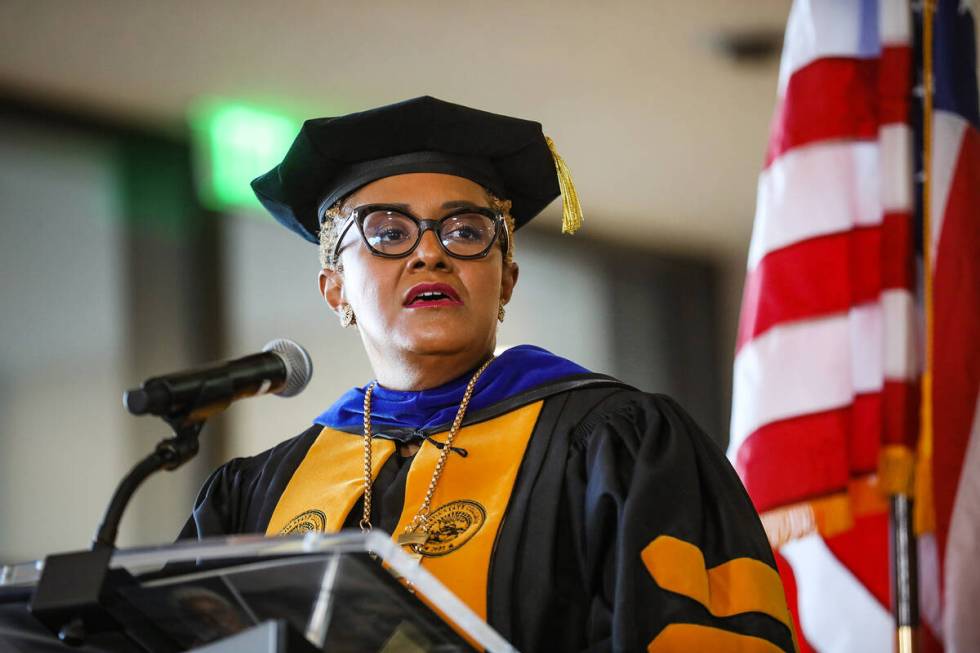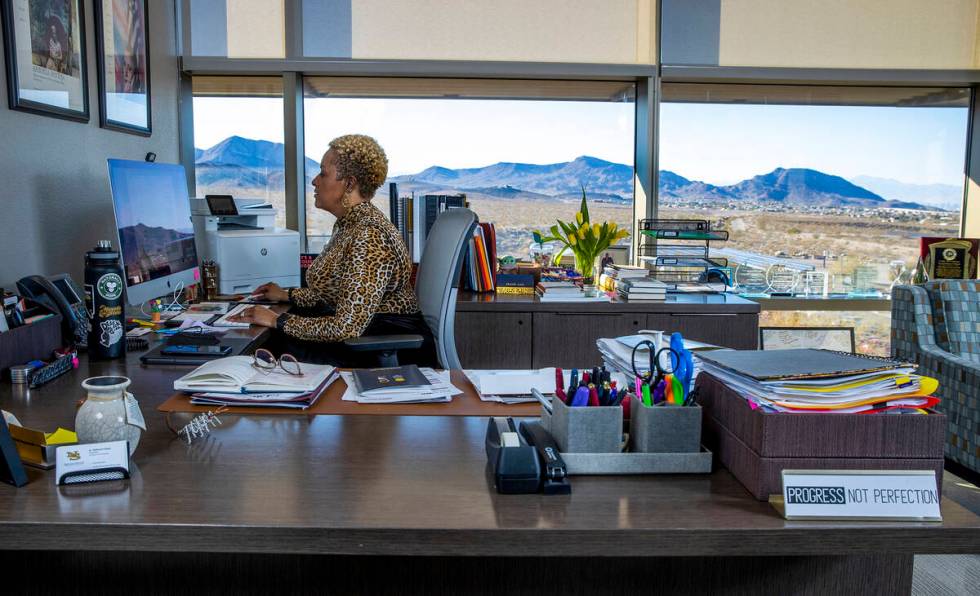The Pathfinder: Nevada has never seen a campus president like DeRionne Pollard
It’s 10 a.m. on a Wednesday in January, and coffee and history are both being made. DeRionne Pollard commands the podium. Her audience: a gathering of academics, educators, college faculty members and students pressed into rows of black chairs, a pair of camera lights with canopies the size of umbrellas warming the room in contrast to the winter chill outside.
They’re clustered in the lobby of the $61.9 million, 65,000-square-foot Christenson Education Building on the campus of Nevada State College, a sleek, two-story symbol of the institution’s continued expansion, complete with an early childhood education center and speech-language pathology clinic.
It’s new: Ground was broken on the building, which opened in the fall, less than two years ago; now, more ground is being broken here today as Pollard, 51, is being inaugurated as the college’s eighth president. When the formalities conclude a half-hour from now, Pollard will exit the stage as the first Black woman to serve as a permanent president in the Nevada System of Higher Education.
For now, though, she’s talking about a door. 
“Yeah, a door,” Pollard tells them. “You walk up to a door and it looks like it should be pushed but ends up needing to be pulled. You ever had that experience?” Everyone has. You smack into the thing, spill coffee all over yourself. Day ruined. “The design of the door was not intuitive to you,” Pollard explains. “Oftentimes, it may not have been designed with you in mind.”
Pollard is turning the door into a metaphor for higher education, how there can be barriers to access for those unfamiliar with the college landscape, especially those with no family history of attendance — first-generation enrollees, immigrants, adult learners, students of color.
The key: Construct more efficient entryways for these kinds of students — students like she once was. Build better doors.
“We’re going to apply — even more so, more deeply — this same attitude and perspective about the work of our students,” Pollard contends in what boils down to her mission statement. Soon, the ceremony comes to a close with a standing ovation and the crowd files out to the patio for brunch.
“She is breaking barriers,” said Melody Rose, NSHE chancellor, as she addressed the audience before Pollard’s speech.
Pollard takes over Nevada State College at a time of tangible momentum for the institution.
Since opening its doors in 2002 with 177 students learning in three classrooms and a library, it’s been developed into a 512-acre campus with more than 800 full- and part-time employees. In 2017, NSC was lauded as the nation’s second-fastest-growing public baccalaureate college from 2005 to 2015, and that growth has continued. In the past five years, the student population has more than doubled to over 7,000 students.
But there are also serious challenges for the college. For starters, Nevada State’s 23 percent graduation rate is 10 percent below the national average. On top of that, less than 25 percent of Nevada’s high school graduates participate in higher education. Moreover, enrollment is down at colleges and universities nationwide. For two years in a row, the numbers have been startling: a 3.2 percent drop in 2020, following a 3.4 percent decline the year before, according to the National Student Clearinghouse Research Center. Even taking the pandemic into account, that’s a substantial loss of nearly a million students.
What’s more, there seems to be a heightened skepticism these days regarding the value of a college education. Even in a relatively strong job market, the high costs of college combined with the uncertainty of whether a degree will lead to employment in one’s chosen field have taken their toll.
“I literally got into a conversation with somebody about this last week,” Pollard recalls, not hiding her exasperation — she’s not big on hiding much of anything. “And they said, ‘Is a college degree even necessary anymore?’ ”
Her life story serves as her answer.
Redefining Destinies
“I’m a little bit sassy, you know?” says Pollard, ensconced in her office a month before the inauguration, chronicling how she came to occupy this corner room, with its sweeping desert views, on the third floor of the Rogers Student Center.
This space is a direct reflection of the woman who occupies it.
“I love quotes,” she says, sitting near a tapestry inscribed with a famous Edith Wharton saying (“There are two ways of spreading light: to be the candle or the mirror that reflects it.”)
“I love their eyes,” she says of a series of four framed portraits of pioneering Hispanic women, including labor leader and civil rights activist Dolores Huerta and attorney-philanthropist Antonia Hernández. (“I want students who walk into this office — we are a Hispanic-serving institution — to see images of folks who look like them.”)
“I love Baby Yoda,” she says of a figurine of the cheek-pinchingly-cute Star Wars character, which rests next to an array of academic awards.
It’s a little past 9 a.m. and Pollard’s day began like it always does: at 5:30 a.m. on the elliptical. She’s been watching “Downton Abbey” while she exercises, and she sees in it yet another metaphor for the state of modern academia. “Abbey” is posited on the time-honored push-pull between the old and the new, between tradition and technological, institutional and cultural advancement, between a proven way of doing things and an unproven — yet forward-thinking — approach.
“This is what I think we are existing in right now,” she says. “This tension: Do I want to be a true disciplinarian in a particular area of study? Or in interdisciplinary work and being able to manipulate your knowledge in a way that it becomes currency, which is where I think the future of the economy is.”
Pollard speaks of the future a lot, but she does so in the same way that she talks about higher ed, with a no-nonsense, pragmatic idealism.
To her, the path forward for institutions like NSC is to balance the lofty ideals of a college education — the polishing of what renowned educator E.D. Hirsch called the “furniture of the mind” — with developing the kind of tangible skills that’ll better lead to employment opportunities upon graduation.
“Most of the kids who come here — one, they’re not kids, most of them are working adults,” she observes. “Yeah, they may be trying to read good books, become better writers and all this, but most of them are coming here because they want their shot at the American Dream. They want to redefine their destiny and that of their family. They want to end generational poverty. They want to have upward mobility.
“They’re not going to be able to do that if we’re always talking about furniture of the mind,” she adds. “We need a skill set.”
Almost Didn’t Make It
“Not once, not twice, not three times — four times!” Pollard exclaims. She’s counting how often she almost flunked out of college. Born on the South Side of Chicago, Pollard and her sister, Dawne, were raised by her father, a Vietnam vet, after her mother died when she was young. No one in her family had ever gone to college, and she didn’t see herself doing so either. At 17, she signed up for the Marines, even took the entry test and got a high score, before her dad made a deal with her: Go to college for a year. Give it a shot. After that, sign up for the Marines if you like. “I went to college,” Pollard says, “and I never left.” 
She was lured to Iowa State University by a tree on the cover of the school’s recruiting brochure, which reminded her of the oak-lined street she grew up on. It seemed like home. But Pollard’s transition to college was a brutal one: Juggling three jobs at times, she struggled to balance work and her studies as a pre-law student majoring in political science and economics.
“I knew I was smart; I thought I had potential,” she says. “But I didn’t know what that looked like, and I was so overwhelmed by everything that was going on around me.”
Pollard, who’s openly lesbian, was also coming to terms with who she was as a person. “I grew up in a Black Baptist church. I was trying to reconcile my sexuality. I was trying to reconcile a mission of being a transformative figure in your community. I kept taking religious studies classes. I thought that would help me figure it out.”
On her first day of college, she met fellow student Robyn Jones. The two became fast friends, which blossomed into a relationship, then marriage and, eventually, parenthood (they have a 15-year-old son).
“It was almost like when she came to college she was escaping something,” Jones recalls. “Her father was very strict, as well, so when she got to college, she kind of lost her mind. She had all this freedom. To see her struggle and almost flunk out of college, I was like, ‘What are you doing? What’s going on with you?’ Because she was so brilliant — she was as brilliant then as she is now.”
Pollard confided to one of her employers, an attorney for whom she babysat, that she was going to drop out and become a nanny. The woman offered to pay her to quit one of her jobs and spend the time studying instead. It was a turning point for Pollard, along with seeking academic counseling to better manage her course load. At the end of that semester, she made the dean’s list. “I was floored,” she recalls. “You mean I can do this? That’s when it clicked for me.”
A Real-World Education
Pollard really likes books. “The best thing that ever happened to me was a Kindle,” she says, “because we’d go on vacation and I’d have a separate suitcase full of books.” And she really likes teaching. Her first year of grad school at Iowa State she was named teaching assistant of the year. But she found that she didn’t love the teaching of books.
Upon getting her master’s degree from Iowa State in 1995, Pollard became an English teacher at the College of Lake County in Lake County, Illinois. “All these books I would teach, but I realized that wasn’t benefiting the student in a lot of ways,” she explains. “So I changed my whole curriculum — it was an initiative in our department — to make it rhetoric- and argumentative-based, because the reality is that most of our students needed to have Comp II be a service course for them. They aren’t going to become English majors. Why are we teaching them how to write literature and analyze that? We should be teaching them how to do research writing.”
This anecdote speaks to the heart of Pollard’s approach: cultivating a real-world know-how that’ll translate directly to the job market. She believes that this means an added emphasis on multidisciplinary education and the ability to synthesize different fields. She recalls a story she heard on public radio, about a poorly written news release from the Centers for Disease Control and Prevention regarding new guidelines around mask-wearing and quarantining.
“They said that part of it was that they didn’t have the right people explaining that,” Pollard says. “I literally just had that conversation with some of our faculty a couple weeks ago: Is that an opportunity for a new major?
“It’s not going to be one that people understand immediately,” she continues, “someone who has an intersection of a communications background and enough science that they’re able to translate. The knowledge economy is going to be about people who are able to translate, create and synthesize knowledge in a way to make it accessible. That’s the type of jobs we need to be talking about.” 
‘These Students Are Me’
In 2008, Pollard became the president of Las Positas College in Livermore, California; two years later, she accepted the same position at Maryland’s Montgomery College, a three-campus community college with more than 55,000 students in the Washington, D.C., area.
“She had an absolutely lasting impact on us,” says Stephen Cain, chief of staff/chief strategy officer at Montgomery. “She made a huge difference in many of the things that we do, really changed the college culture around students’ success.”
One of the things Pollard emphasized at Montgomery was not just cultivating a diverse student body and being a gateway for first-generation college attendees — but keeping them enrolled.
“We’re a very diverse institution that had a lot of first-generation students at that time,” Cain says, “but the key thing that really got us thinking in a new way was looking at not just what students came to the institution, but which students were leaving with their degree in hand. When we started looking at that, we discovered that there were some significant gaps that we were not proud of.
“That became our focus in so many different ways,” he continues. “We made these discoveries, had these reports that analyzed this early on in her tenure here. Then that became our focus as an institution for the remaining years.”
To this end, Pollard partnered in launching Achieving Collegiate Excellence and Success (ACES), a support program to help disadvantaged students transition from high school to college completion. When Pollard left Montgomery College, the program had over 2,500 enrollees, and those students had a 20 percent higher retention rate from their first year to their second year at Montgomery College compared with their peers.
Pollard says that she wasn’t actively seeking to move on from Montgomery College when she got a phone call from a girlfriend out of the blue on a Saturday morning last spring.
“She said, ‘Hey, have you checked out this job?’ ” Pollard recalls. “I’m like, ‘Girl, I’m not looking for a job. I’ve got a contract.’ ” Pollard looked up the college’s accreditation report online anyway. “All of a sudden I started saying, ‘I belong here. This is my place. This is what I think I’ve been prepared to do,’ ” Pollard remembers. “When I read who the students were, I said, ‘These students are me; I am them.’ For the first time in a decade, I wrote a letter to a search consultant and said, ‘Let me talk to you about Nevada State.’ ”
Living Out Loud
Although she was inaugurated in January, Pollard has been on the job since August, cannonballing herself into her new role.
“I think we held almost 50 listen-and-learn sessions where she was meeting with internal and external stakeholders, listening to what their experiences have been and what their hopes and dreams for the institution were moving forward,” says Amber Lopez Lasater, chief of staff at Nevada State. “A lot of times you’ll see leaders, especially at Dr. Pollard’s level, come in and think they know all the answers. She took a 180 degree of that and came in knowing that she had a lot to learn.”
Pollard is big on accessibility. She frequently eats in the school cafeteria to interact with students. Nevada State Student Alliance President Lauren Porter recalled one such exchange during a speech at Pollard’s inauguration.
“A student came up to a few NSSA members and fan-girled. She said, ‘I can’t believe that the president of our college just came up and talked to me — to me,’ ” Porter said. “This student felt seen.”
Pollard understands the value of feeling like you’re being seen and heard on a personal level — it’s one reason she’s open about her sexuality.
“I choose to live my life out loud,” she says, “because I’m hopeful that I can help inform somebody else and make their pathway a little bit easier.”
She shares a moment at Montgomery College, when a student came up to her in a hallway and said that he read a story about her in The Washington Post. His eyes welled up as he told her that he’d recently come out to his parents.
“I said, ‘Oh, how did that go for you?’ ” Pollard recalls. “And he said, ‘Not so well. My dad won’t talk to me anymore. My mom says that I’m never going to have a career; I ruined my life.’ But the day that you were named president of this college, I took that newspaper home to my mom and I said, ‘I may not be able to be anything, but I can be a college president one day.’ ”
The End of Nevada State College?
If Pollard has her way, her days as a “college” president will end soon: She plans to seek approval from NSC’s board of regents to change the school’s name to Nevada State University. “We are a four-year institution offering both baccalaureate and master’s degrees,” she said in her inauguration address. “We need to call ourselves what we are: a university.”
She’s already launched other initiatives, including a partnership with the Regional Transportation Commission of Southern Nevada that gave students and faculty two weeks of free bus rides when classes resumed in mid-January to ease the burden of commuting to the campus on the southern edge of Henderson. That may seem like a small thing, but not when you’re struggling to put food on the table.
“When I was in college, I was on food stamps. I was hemmed up in student loans,” she says. “I didn’t come from a place where somebody sent me $500 a couple times a year to get to school. I didn’t have care packages — it’s not because my family and community didn’t care for me, but we didn’t know what to do. I remember that.
“I know that I’m here because, oftentimes, there was some duct tape and glue and a whole lot of folks who helped me be here,” she continues. “I’m also here because I had to learn a system that was not designed for me and wasn’t really intended for me to be successful, but I was able to navigate that. So, when I walk around this campus and students look at you and they’re like, ‘Oh, you’re the president?’
“Yeah,” she says matter-of-factly, “and that means I believe that I’m warming this seat up for you.”













